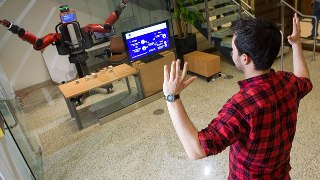Sep 16 2014
George Jetson’s Rosie the Robot, R2-D2 and the Energizer Bunny won’t be there, but the powerful minds behind tomorrow’s innovative robots will be.
 Adam Barber, a former Ph.D. student in the Neuroscience and Robotics Lab (NxR), interacts with RJ, a robot purchased for teaching and research in human-robot interaction. Northwestern researchers have developed new technologies for rehabilitation robotics, advanced prosthetics, brain-machine interfaces and other types of human-robot interaction.
Adam Barber, a former Ph.D. student in the Neuroscience and Robotics Lab (NxR), interacts with RJ, a robot purchased for teaching and research in human-robot interaction. Northwestern researchers have developed new technologies for rehabilitation robotics, advanced prosthetics, brain-machine interfaces and other types of human-robot interaction.
Nearly 2,000 robotics leaders from around the world, including many experts from Northwestern University and the Rehabilitation Institute of Chicago (RIC), are in Chicago this week (Sept. 14 to 18) to attend the 2014 IEEE/RSJ International Conference on Intelligent Robots and Systems (IROS) at the Palmer House Hilton.
Northwestern and RIC researchers will discuss their pioneering work improving robotic arm control, providing sensation of a missing hand, developing neural prosthetics to help paralyzed people regain the use of their arms, coordinating swarms of small robots, developing a robotic fish with bio-inspired sensing and motion capabilities, and translating robotics research into startup companies, among other things.
“Robotics is a hot field right now, with new technology and software enabling robotics researchers to design powerful and precise robots that can safely collaborate with humans,” said Kevin M. Lynch, conference general chair and professor of mechanical engineering at Northwestern.
“Robots have a long history in manufacturing, but these machines are largely bolted to the floor and don’t interact much with people,” Lynch said. “Today’s new generation of robots have grown into a wide array of applications, such as advanced prosthetics, automated fulfillment of Amazon orders, computerized surgery, home cleaning and even driverless cars. The IROS conference will highlight the researchers, technology and companies, both large and small, that are part of this robotics revolution.”
Northwestern -- which is launching a Master of Science in Robotics program this fall -- is a leader in robotics research, having developed new technologies for rehabilitation robotics, advanced prosthetics, brain-machine interfaces and other types of human-robot interaction. These technologies, for example, now help stroke patients recover their ability to walk and help people who are paralyzed from the neck down to use their own arms. Much of this work is done in collaboration with RIC.
Northwestern and RIC will be well represented at the IROS conference, including these faculty members and robotics laboratories:
- “Development of Neural Interfaces for Robotic Prosthetic Limbs,” 8 a.m. Tuesday, Sept. 16. Prosthetics expert Todd Kuiken, M.D., will deliver one of three plenary lectures, discussing advances in the ability to control complex artificial limbs. Specifically, he will describe a new surgical technique called Targeted Muscle Reinnervation that uses nerve transfers to improve robotic arm control and provide sensation of the missing hand. Kuiken is a professor of physical medicine and rehabilitation and biomedical engineering at Northwestern and director of the Center for Bionic Medicine at the Rehabilitation Institute of Chicago.
- “Industry Forum: Perspectives on Entrepreneurship in Robotics and Automation,” 9 a.m. to 5:30 p.m., Tuesday, Sept. 16. Michael Peshkin, a researcher in robotics and human interaction, will present a keynote address at 1:30 p.m. on transitioning innovations from the lab to a startup company. His topics will include the intellectual property and equity relationship with a university, working with students or former students, and stories from several startups. A professor of mechanical engineering, Peshkin is a co-founder of four spinoffs, most recently Evanston-based Tangible Haptics, which is developing surface-haptic technology that lets you feel what you see on a touchscreen.
- “Rehabilitation and Assistive Robotics: Bridging the Gap between Clinicians and Roboticists,” all day, Thursday, Sept. 18. An expert in robotic devices that provide physical assistance, Brenna D. Argall is organizing a workshop bringing clinicians and roboticists together to identify the key challenges in rehabilitation and assistive robotics, collaborations for funding opportunities, benchmarks and challenge problems for the field. Argall is an assistant professor of electrical engineering and computer science and physical medicine and rehabilitation.
- “Technical Tour of the Rehabilitation Institute of Chicago and Northwestern University,” afternoon of Thursday, Sept. 18. Conference participants will tour robotics labs of RIC and Northwestern’s Neuroscience and Robotics Lab (NxR). Topics to be covered include advanced prosthetics, rehabilitation robotics, autonomous mobile assistive robots and lower limb exoskeletons (powered wearable devices, such as Sigourney Weaver’s “loader” in Aliens 2).
- “Hops n’ Bots at the Adler Planetarium,” 6 to 10 p.m. Thursday, Sept. 18, Adler Planetarium. Part of an Adler After Dark event, two Northwestern professors will participate in a panel discussion about cutting-edge robotics, titled “Robotic Cheetahs, Fish, Fingers and Bacteria: The Coming Menagerie of Mechanical Cohabitants,” at 8:30 p.m. Ed Colgate, whose work focuses on physical human and robot interaction, will moderate. He is the Breed University Professor of Mechanical Engineering. Panelist Malcolm MacIver will talk about the robotic fish he has developed, inspired by the weakly electric black ghost knifefish of the Amazon basin, which could pave the way for highly agile underwater vehicles. MacIver is an associate professor of mechanical and of biomedical engineering. Other panelists are from the Massachusetts Institute of Technology, the University of Pisa and ETH Zurich.